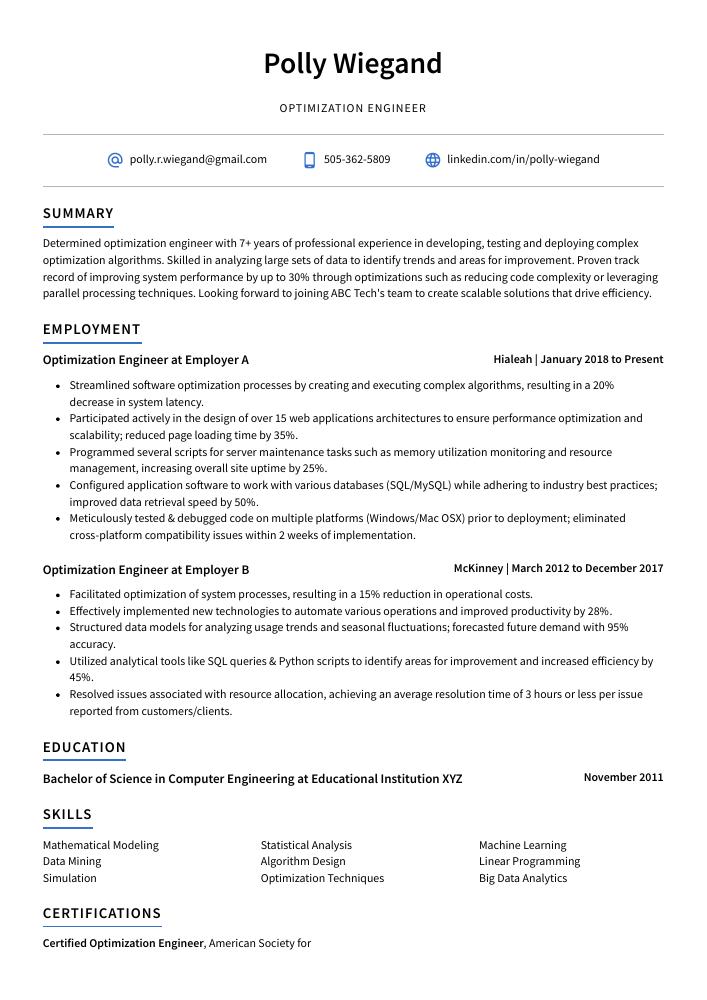Optimization Engineer Resume Guide
Optimization Engineers are responsible for optimizing the performance of a system by analyzing its technical components and making adjustments to maximize efficiency. They work with various technologies, such as software engineering, artificial intelligence, machine learning, data analysis and more to identify areas that can be improved upon in order to increase productivity or reduce costs. Additionally they develop models and simulations to test how different configurations could affect system performance.
You can optimize any system to work more efficiently and cost-effectively, but employers don’t know it yet. To make them aware of your capabilities, you must write a resume that stands out from the competition.
This guide will walk you through the entire process of creating a top-notch resume. We first show you a complete example and then break down what each resume section should look like.
Table of Contents
The guide is divided into sections for your convenience. You can read it from beginning to end or use the table of contents below to jump to a specific part.
Optimization Engineer Resume Sample
Polly Wiegand
Optimization Engineer
polly.r.wiegand@gmail.com
505-362-5809
linkedin.com/in/polly-wiegand
Summary
Determined optimization engineer with 7+ years of professional experience in developing, testing and deploying complex optimization algorithms. Skilled in analyzing large sets of data to identify trends and areas for improvement. Proven track record of improving system performance by up to 30% through optimizations such as reducing code complexity or leveraging parallel processing techniques. Looking forward to joining ABC Tech’s team to create scalable solutions that drive efficiency.
Experience
Optimization Engineer, Employer A
Hialeah, Jan 2018 – Present
- Streamlined software optimization processes by creating and executing complex algorithms, resulting in a 20% decrease in system latency.
- Participated actively in the design of over 15 web applications architectures to ensure performance optimization and scalability; reduced page loading time by 35%.
- Programmed several scripts for server maintenance tasks such as memory utilization monitoring and resource management, increasing overall site uptime by 25%.
- Configured application software to work with various databases (SQL/MySQL) while adhering to industry best practices; improved data retrieval speed by 50%.
- Meticulously tested & debugged code on multiple platforms (Windows/Mac OSX) prior to deployment; eliminated cross-platform compatibility issues within 2 weeks of implementation.
Optimization Engineer, Employer B
McKinney, Mar 2012 – Dec 2017
- Facilitated optimization of system processes, resulting in a 15% reduction in operational costs.
- Effectively implemented new technologies to automate various operations and improved productivity by 28%.
- Structured data models for analyzing usage trends and seasonal fluctuations; forecasted future demand with 95% accuracy.
- Utilized analytical tools like SQL queries & Python scripts to identify areas for improvement and increased efficiency by 45%.
- Resolved issues associated with resource allocation, achieving an average resolution time of 3 hours or less per issue reported from customers/clients.
Skills
- Mathematical Modeling
- Statistical Analysis
- Machine Learning
- Data Mining
- Algorithm Design
- Linear Programming
- Simulation
- Optimization Techniques
- Big Data Analytics
Education
Bachelor of Science in Computer Engineering
Educational Institution XYZ
Nov 2011
Certifications
Certified Optimization Engineer
American Society for Quality (ASQ)
May 2017
1. Summary / Objective
Your resume summary/objective should be a concise yet compelling summary of your qualifications as an optimization engineer. In this section, you can highlight the most important skills and experiences that make you stand out from other candidates. For example, mention the advanced mathematical models you have experience working with, any relevant certifications or awards won in the past, and how you’ve successfully optimized complex systems for maximum efficiency.
Below are some resume summary examples:
Talented optimization engineer with 5+ years of experience in developing innovative solutions to maximize efficiency and reduce costs. Experienced at analyzing complex problems, identifying root causes, and implementing creative engineering solutions. At XYZ Inc., improved the productivity of 4 assembly lines by 25% through process optimization. Proven track record for providing value-added recommendations that enhance operational effectiveness while reducing overhead expenses.
Professional optimization engineer with 8+ years of experience optimizing operational processes and systems. Skilled in using data analytics, AI-based algorithms, predictive modeling, and simulation techniques to identify process flaws and opportunities for improvement. At XYZ Company, implemented an optimization strategy that reduced annual costs by 20%. Seeking to join ABC Tech as a senior optimization engineer where I can continue making an impact on the bottom line.
Energetic optimization engineer with 5+ years of experience in developing and executing optimization strategies for businesses. Proven track record of boosting efficiency and profits through process automation, cost analysis, data mining techniques, predictive analytics, and machine learning models. At XYZ Company increased customer retention rate by 25% using A/B testing to identify the best marketing campaign strategy.
Dependable optimization engineer with 8+ years of experience in designing and executing optimization strategies for high-performance applications. Skilled at developing algorithms, collecting data, analyzing results, and collaborating to optimize software performance. At XYZ Corporation I led a team that improved system latency by 20%. Received the “Star Performer” award for my contributions to the company’s success.
Proficient optimization engineer with a proven track record in creating and implementing strategies to maximize efficiency, reduce costs, and increase profits. At XYZ Corporation, designed an automated system that reduced waste by 25% while increasing production output by 30%. Skilled at utilizing various software systems to streamline processes and optimize operations for maximum profitability.
Hard-working optimization engineer with 6+ years of experience in algorithm development and predictive analytics. Seeking to join ABC Tech to use data-driven insights to create efficient, cost-effective solutions for the company’s global client base. At XYZ Corporation, identified a significant process bottleneck that boosted CI/CD efficiency by 23% while reducing costs by $49K annually.
Amicable optimization engineer with 8+ years of experience in data-driven decision making to improve the performance and scalability of software infrastructure. Seeking to bring my skill set to ABC Company, where I can help maximize efficiency by utilizing sophisticated optimization algorithms. At XYZ, increased system throughput by 17% through advanced optimization techniques.
Detail-oriented optimization engineer with 7+ years of experience in optimization, data analysis and machine learning. Proven track record of optimizing systems for maximum efficiency. Led numerous projects to improve system performance by an average of 45%. Looking to bring expertise in A/B testing, predictive analytics and AI/ML models to ABC Tech as an Optimization Engineer.
2. Experience / Employment
The work history/experience section of your resume is where you provide details on the roles you have held. This should be written in reverse chronological order, with your most recent job at the top of the list.
When writing this section, it’s best to use bullet points; doing so allows for a quick read and makes it easier for recruiters to take in all that you are saying. When stating what you did during each role, try to include quantifiable results or accomplishments as well as technical skills used. For example, instead of simply saying “Optimized code,” say something like: “Reduced runtime from 10 minutes down to 30 seconds by optimizing existing code using C++ algorithms.”
To write effective bullet points, begin with a strong verb or adverb. Industry specific verbs to use are:
- Optimized
- Automated
- Analyzed
- Designed
- Implemented
- Monitored
- Troubleshot
- Resolved
- Streamlined
- Evaluated
- Forecasted
- Programmed
- Configured
- Documented
- Tested
Other general verbs you can use are:
- Achieved
- Advised
- Assessed
- Compiled
- Coordinated
- Demonstrated
- Developed
- Expedited
- Facilitated
- Formulated
- Improved
- Introduced
- Mentored
- Participated
- Prepared
- Presented
- Reduced
- Reorganized
- Represented
- Revised
- Spearheaded
- Structured
- Utilized
Below are some example bullet points:
- Introduced innovative optimization processes that improved the efficiency of data processing by 25%, resulting in a cost savings of $5,000 per month.
- Designed and implemented an automated system for monitoring key performance indicators to ensure optimum use of resources and identify areas needing improvement.
- Monitored changes in customer behavior patterns regularly to uncover new opportunities for product development or marketing campaigns; identified 10+ market segments with potential growth over 2 years period.
- Evaluated existing algorithms used throughout the organization and developed more efficient ones that decreased latency issues by 30% while increasing throughput speed by 40%.
- Accurately predicted output results from various optimizations scenarios within 4 hours on average, providing valuable insights into organizational decision making process as needed.
- Represented a team of 4 engineers in optimizing algorithms for a major technology company, resulting in an average reduction of 10% in development costs over 6 months.
- Reliably identified and corrected software bugs to improve code efficiency by 20%, saving the company approximately $1M annually.
- Formulated complex mathematical models to optimize existing systems, leading to an increase of 15% in processing speed across all applications within 3 weeks of implementation.
- Revised optimization strategies on a quarterly basis according to customer needs and market changes; improved product performance metrics by 30%.
- Troubleshot production errors while modifying codes as required, reducing downtime due to system failures by 25 hours per month on average.
- Advised a team of 10 optimization engineers in the design and development of complex algorithms to optimize digital media campaigns, resulting in a 15% increase in customer engagement.
- Achieved cost savings through automation processes with an average reduction of 40 hours per month on manual work load; successfully optimized over 500+ webpages for SEO purposes.
- Implemented a test-and-learn approach to continuously measure client program performance; identified areas for improvement that yielded 75% greater ROI than expected results within 6 months.
- Thoroughly analyzed data from multiple sources such as Google Ads, Facebook Ads and Amazon Ads to provide key insights into campaign effectiveness and create targeted strategies tailored to each platform’s specific audience segmentation criteria.
- Coordinated across teams at various locations worldwide by leading weekly meetings and providing technical guidance as needed; managed projects that increased conversion rates by 20%.
- Developed and implemented optimization algorithms to improve the efficiency of production processes, resulting in a 20% reduction in time and cost.
- Expedited data collection efforts and improved accuracy by leveraging AI-driven technologies such as machine learning models; increased throughput rate by 45%.
- Analyzed large datasets using statistical software tools like SPSS & SAS to identify key trends, uncovering areas for operational improvement that resulted in $7000 savings over 6 months.
- Improved process flow designs through creative problem solving techniques, reducing bottlenecks and increasing output capacity by 30%.
- Confidently worked with cross-functional teams from multiple departments including IT, Operations Management & Quality Assurance to optimize existing systems according to industry best practices.
- Prepared and implemented optimization strategies for various types of engineering projects, resulting in a 15% reduction in cost and a 20% increase in production efficiency.
- Documented all processes, procedures and design requirements to ensure accuracy of data analysis; successfully established an optimized workflow process within the team that increased overall productivity by 30%.
- Automated complex computational tasks using advanced algorithms to reduce manual effort and time spent on problem-solving; improved system performance by 40%.
- Resourcefully identified bottlenecks while troubleshooting existing software systems, leading to successful resolution of over 50 technical issues with minimal downtime.
- Mentored junior engineers on basic optimization principles as well as best practices for maintaining efficient code structures, increasing their knowledge base by 55%.
- Tested and optimized various types of software applications, resulting in a 25% increase in overall system performance.
- Presented solutions to management team and other stakeholders to help improve existing processes, reducing labor costs by $7000 over the course of three months.
- Reduced downtime associated with key systems by 45%, leading to increased customer satisfaction ratings across the board.
- Spearheaded automation initiatives that resulted in an extra 4 hours saved per week on manual tasks and improved accuracy levels for data-driven reports across teams by 30%.
- Actively participated in cross-functional meetings with different departments to identify areas for improvement within product operations; implemented changes which resulted in a 20% reduction of operating costs annually.
- Independently assessed and optimized the performance of existing engineering processes to increase efficiency, resulting in a 20% reduction in production costs.
- Compiled data from multiple sources to identify areas for improvement within the system architecture, leading to improved scalability with an additional 10+ servers added on-site.
- Reorganized workflows across 3 departments through effective resource management strategies; reduced project turnaround time by 25%.
- Utilized database optimization techniques such as indexing and query tuning to enhance website loading speed by 40%.
- Collaborated closely with IT teams to implement new technologies that increased user satisfaction ratings by 15%, translating into higher customer retention rates and revenue growth of $50K annually.
3. Skills
The skillset employers require in an employee will likely vary, either slightly or significantly; skimming through their job adverts is the best way to determine what each is looking for. One organization might be looking for someone proficient in mathematical modeling and another might require expertise with machine learning.
It is important to tailor the skills section of your resume according to each job that you are applying for, as many employers use applicant tracking systems these days which scan resumes for certain keywords before passing them on to a human.
In addition, it’s also beneficial to elaborate further on the most relevant skills/qualifications within other sections such as the summary or experience section.
Below is a list of common skills & terms:
- Algorithm Design
- Big Data Analytics
- Data Mining
- Linear Programming
- Machine Learning
- Mathematical Modeling
- Optimization Techniques
- Risk Analysis
- Simulation
- Statistical Analysis
4. Education
Including an education section on your resume will depend on how far along you are in your career. If you just graduated and have no work experience, mention your education below the resume objective. On the other hand, if you have been working as an optimization engineer for several years with plenty of achievements to showcase, omitting this section is perfectly fine.
If an education section is included, try to focus on courses and subjects related to the optimization engineering role that are relevant to potential employers.
Bachelor of Science in Computer Engineering
Educational Institution XYZ
Nov 2011
5. Certifications
Certifications are a great way to demonstrate your expertise and proficiency in a certain field. They provide potential employers with evidence that you have been tested and are qualified for the job.
If there is an industry-specific certification or qualification related to the position you’re applying for, make sure it’s included on your resume as this will give you an edge over other applicants who may not have such credentials.
Certified Optimization Engineer
American Society for Quality (ASQ)
May 2017
6. Contact Info
Your name should be the first thing a reader sees when viewing your resume, so ensure its positioning is prominent. Your phone number should be written in the most commonly used format in your country/city/state, and your email address should be professional.
You can also choose to include a link to your LinkedIn profile, personal website, or other online platforms relevant to your industry.
Finally, name your resume file appropriately to help hiring managers; for Polly Wiegand, this would be Polly-Wiegand-resume.pdf or Polly-Wiegand-resume.docx.
7. Cover Letter
Submitting a cover letter with a job application is an effective way of making your resume stand out from the competition. It gives you the opportunity to go into more detail about who you are and why you believe that makes you the perfect fit for the role.
A cover letter should be made up of 2 to 4 paragraphs, addressing some key points such as what skills or experience make you suitable for this position, any relevant achievements and how motivated and passionate about this specific job opening. Writing one isn’t always mandatory but it can certainly give your application a boost!
Below is an example cover letter:
Dear Oswaldo,
I am writing to express my interest in the Optimization Engineer position at Amazon. With a Bachelor’s degree in Industrial Engineering and three years of experience working in optimization and supply chain management, I am confident I can be an asset to your team.
In my current role as an Optimization Engineer at XYZ Corporation, I work on a variety of projects that require me to use my engineering skillset to find creative solutions that improve efficiency and save costs. I have also developed strong project management skills that allow me to see projects through from start to finish, ensuring all deadlines are met and all stakeholders are satisfied with the final results.
Some examples of the optimization projects I have worked on include:
– Implementing a new inventory management system that reduced stock levels by 10% while still maintaining customer satisfaction levels; this saved the company $1 million per year in storage costs
– Developing a new production schedule that increased output by 15% while reducing overtime hours by 20%; this resulted in annual savings of $500,000 for the company
– Creating a transportation plan that reduced shipping times by 30% while still maintaining delivery rates; this saved the company $200,000 per year in shipping costs
Sincerely,
Polly
Optimization Engineer Resume Templates
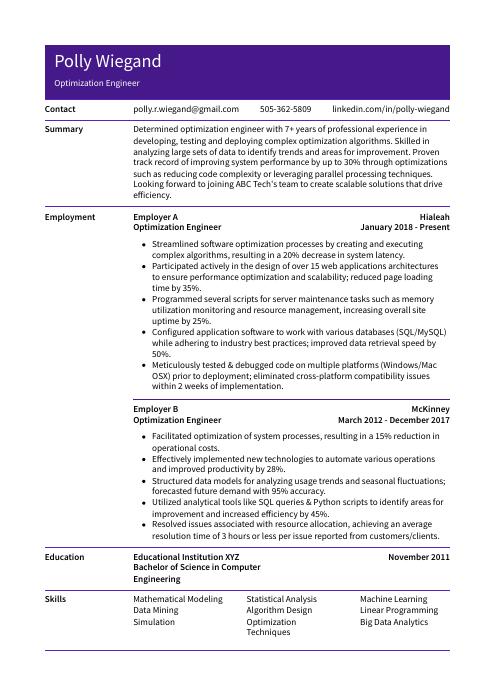 Pika
Pika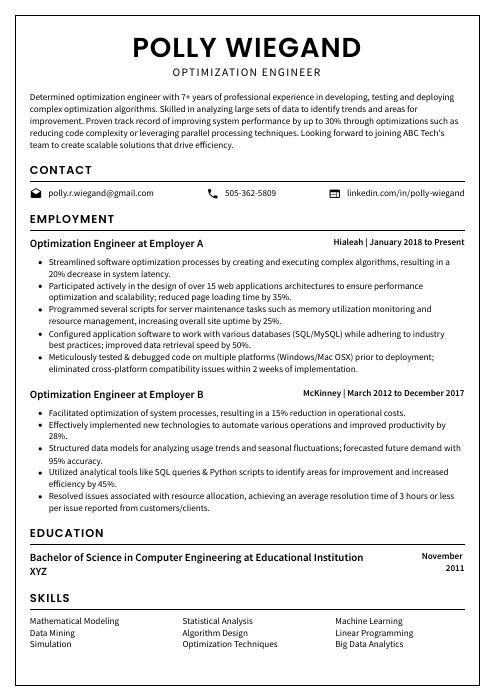 Cormorant
Cormorant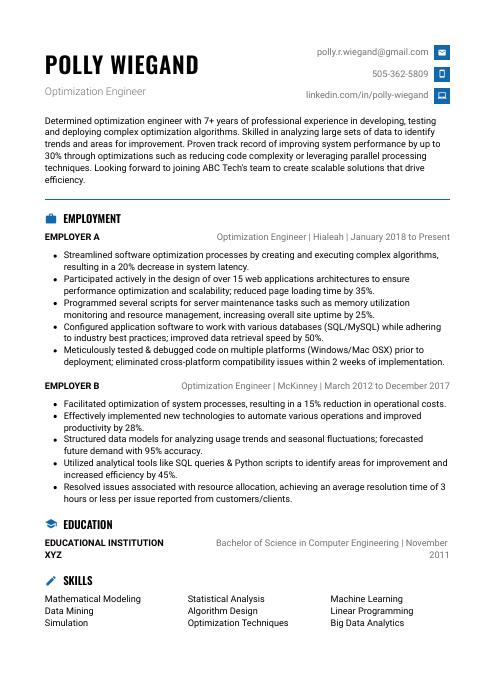 Echidna
Echidna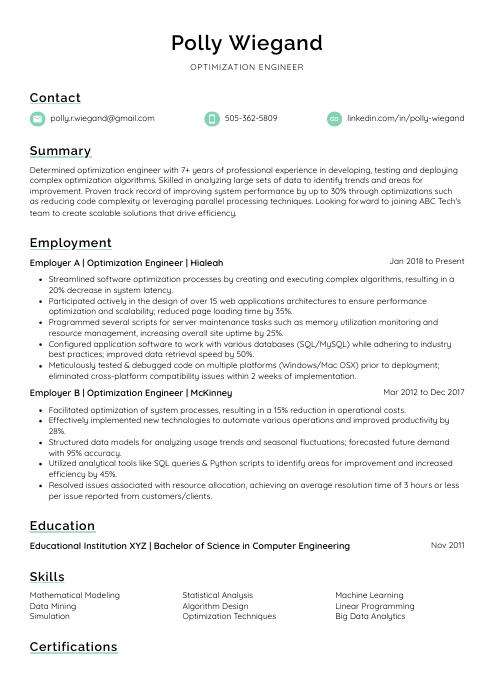 Lorikeet
Lorikeet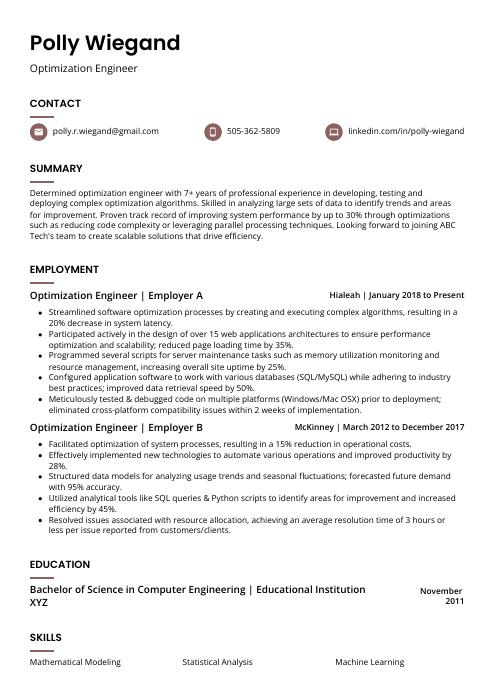 Fossa
Fossa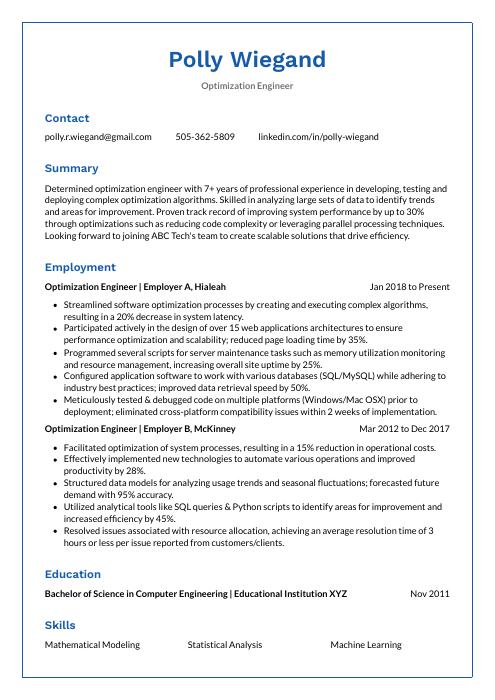 Markhor
Markhor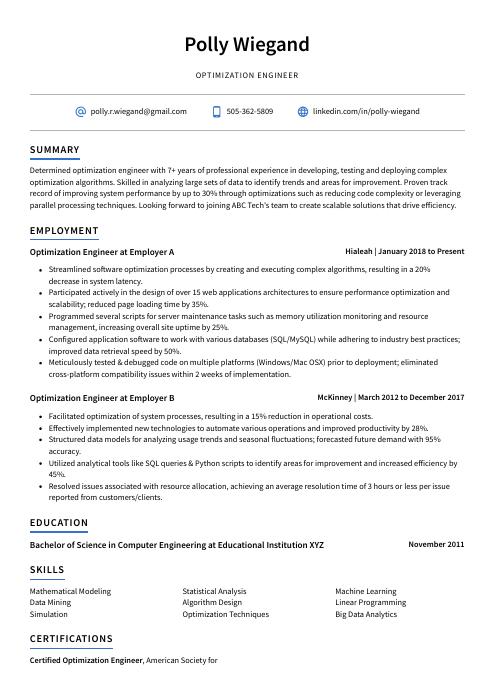 Axolotl
Axolotl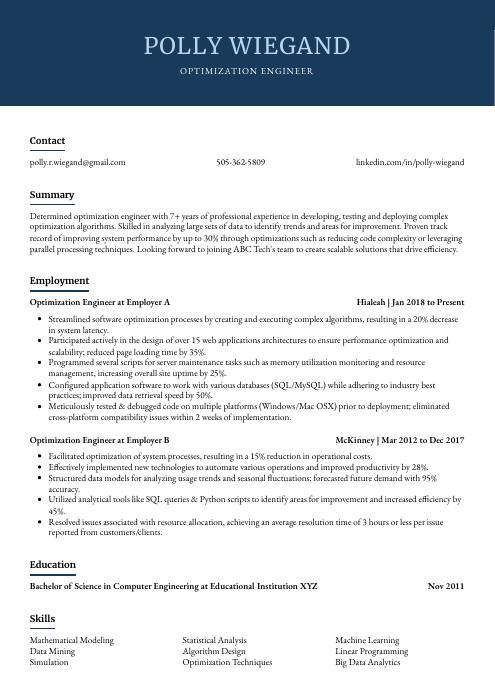 Bonobo
Bonobo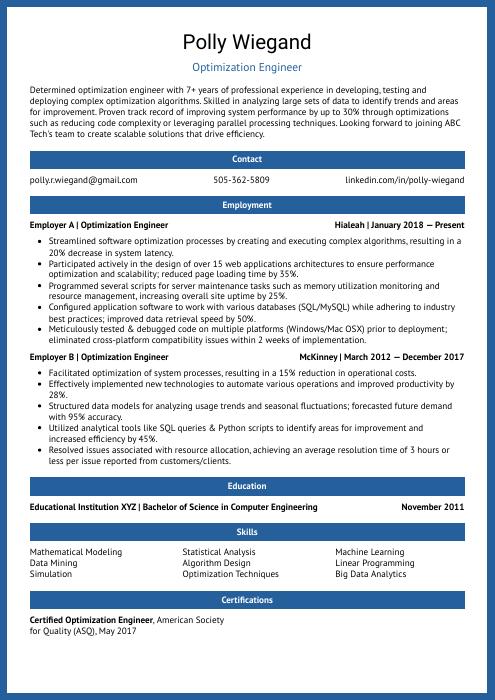 Ocelot
Ocelot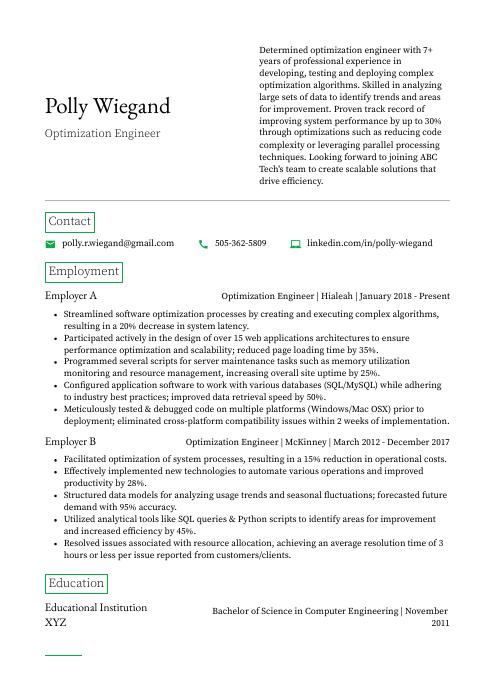 Quokka
Quokka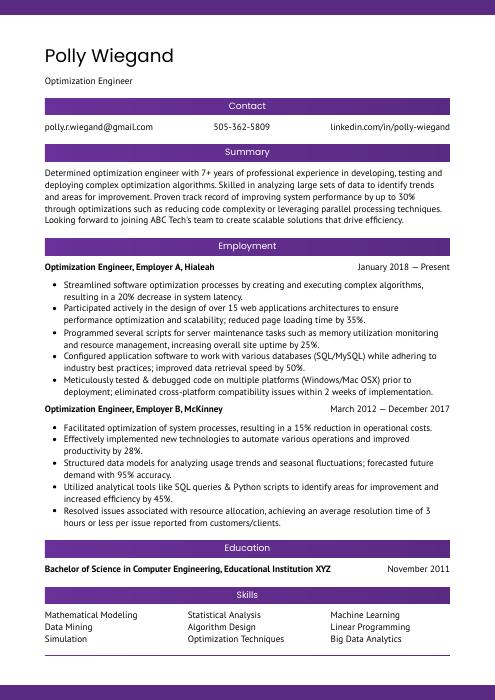 Jerboa
Jerboa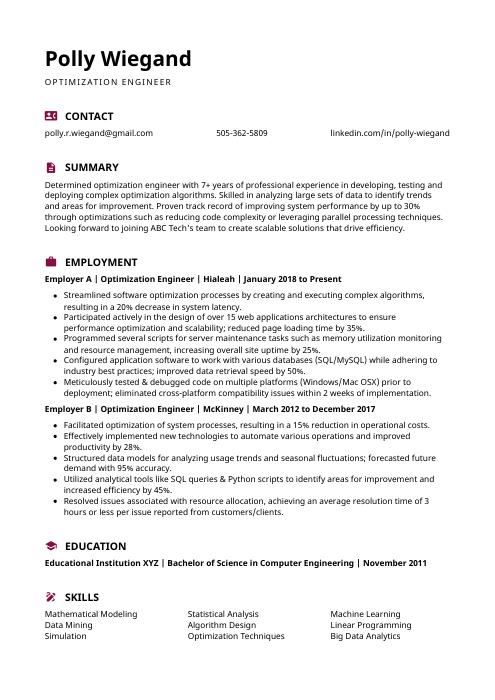 Hoopoe
Hoopoe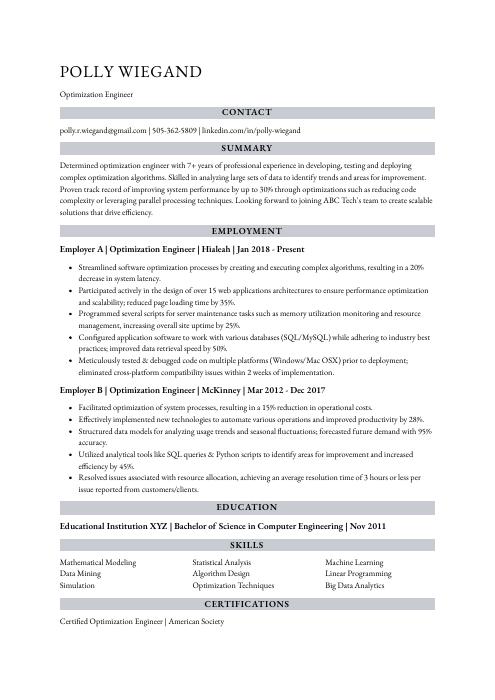 Numbat
Numbat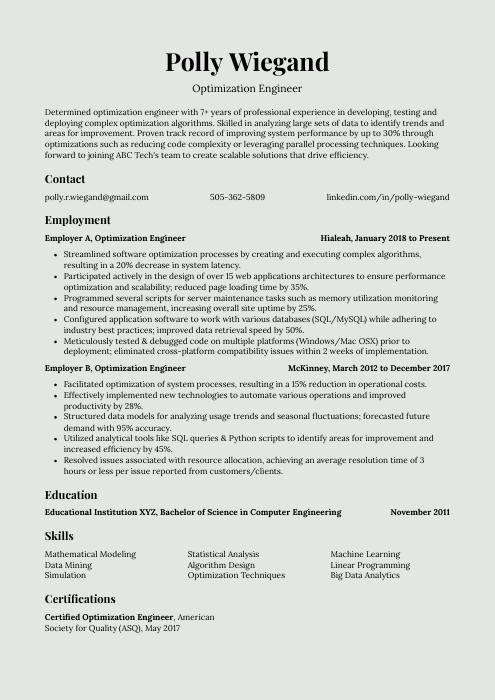 Saola
Saola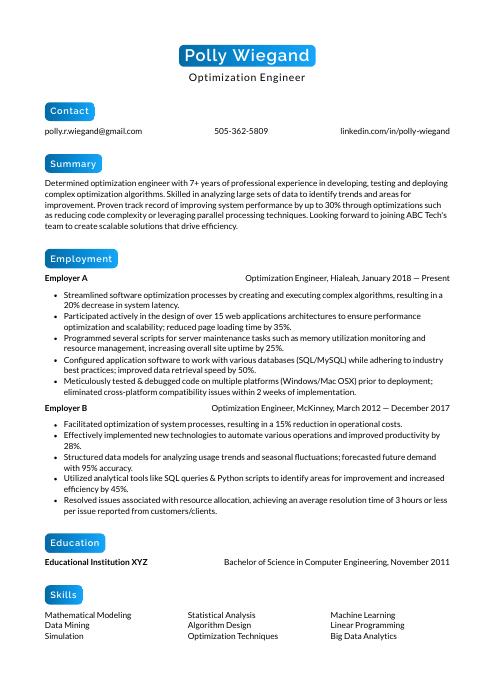 Kinkajou
Kinkajou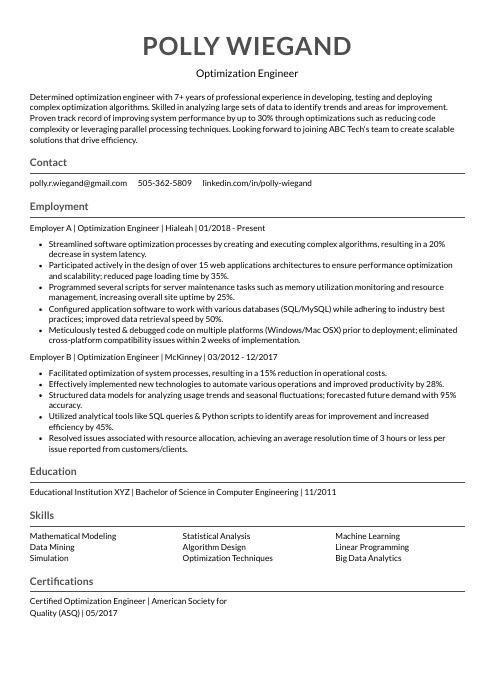 Indri
Indri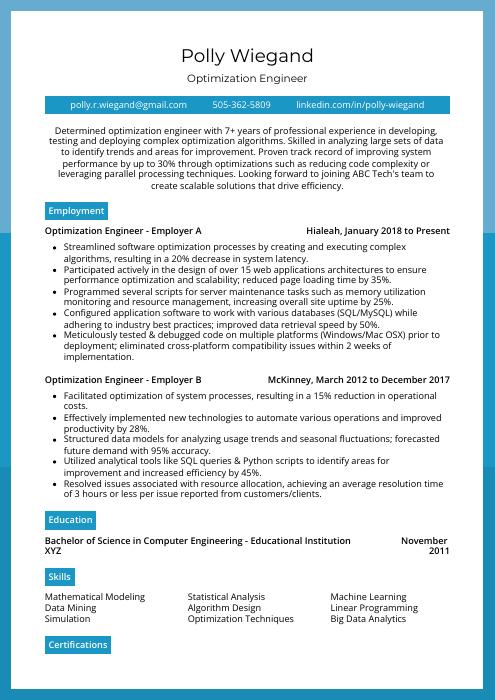 Rhea
Rhea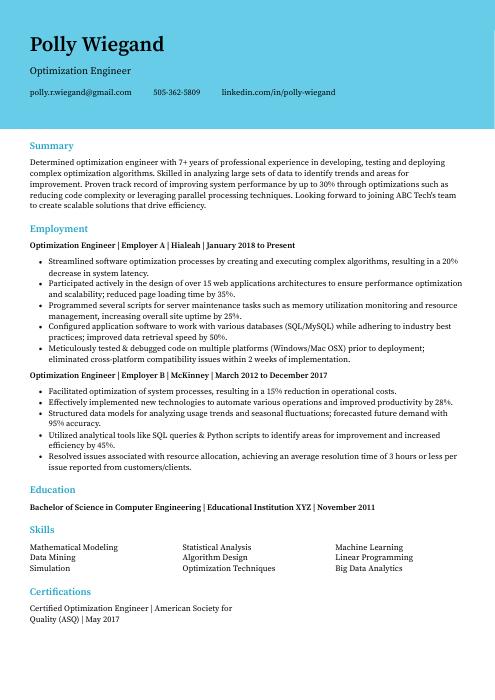 Dugong
Dugong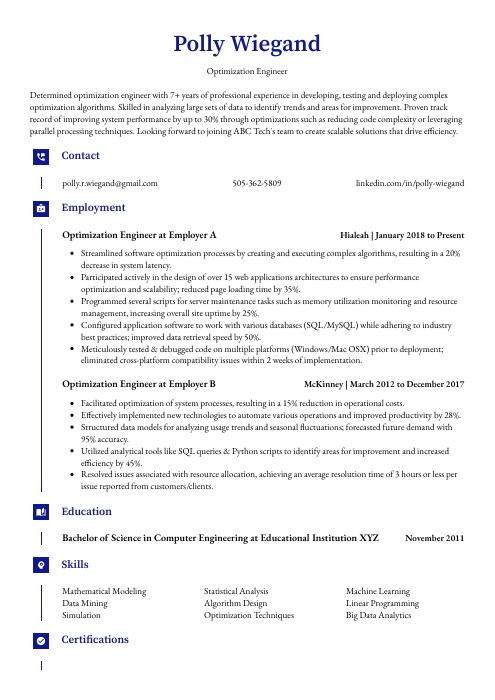 Gharial
Gharial Rezjumei
Rezjumei
